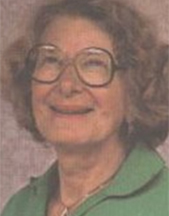1916 – 1988
Dedicated family therapist and compassionate humanist
Virginia Satir made a significant contribution to the direct practice of social work with her workshops, writing, consultation, and demonstrations of practice. She is best known for her work with family therapy and has been referred to as the “Mother of family system therapy.” The systems approach in which she pioneered is now part of every social work practice curriculum.
Virginia was born in Wisconsin where she went to high school, and in 1936 received her BA in Education at the Milwaukee State Teacher’s College (now the University of Wisconsin). After receiving her Master’s of Social Service Administration at the University of Chicago in 1948 she worked at the Dallas Child Guidance Center and at the Illinois State Psychiatric Institute. She joined with Don Jackson Jules Ruskin and Gregory Bateson to establish the widely recognized Mental Research Institute in Palo Alto California in 1959. In 1977 she founded Avanta, a non-profit organization dedicated to training and supporting people “to be more fully human”
Satir wrote or co-wrote twelve books. Her first book, published in 1964 was Conjoint Family Therapy. It remains a classic in the field, has been translated into many languages, and forms the basis for social work with families around the world. Others that are well known are Peoplemaking and The New Peoplemaking. Her books have been translated into several languages and provide a basis for emerging social work practice in many countries. According to the Institute for International Connections, Satir’s methods have been taught at annual training conferences for social workers in Russia, Lithuania, the Czeck Republic, Slovakia and Latvia.
Satir taught an approach and philosophy for social work practice that went well beyond technique or structural approaches. Satir was known for her insight into human communication and she worked to help others realize their full human potential. Her approach influenced an entire generation of learning and provided a foundation for the strengths model found in today’s practice.
In Virginia’s words “Human beings are a marvel, also a treasure, and indeed a miracle.” Her approach, the Human Process Validation Model is based on the premise that all we manifest at any point in time represents what we have learned, consciously, implicitly, and cellularly.
She believed that behavior reflects what we have learned. “Learning is the basis of behavior. To change behavior, we need to have new learning. To accomplish new learning we need a motive, a purpose, a nurturing context and a trust in something from the outside to help us.”
